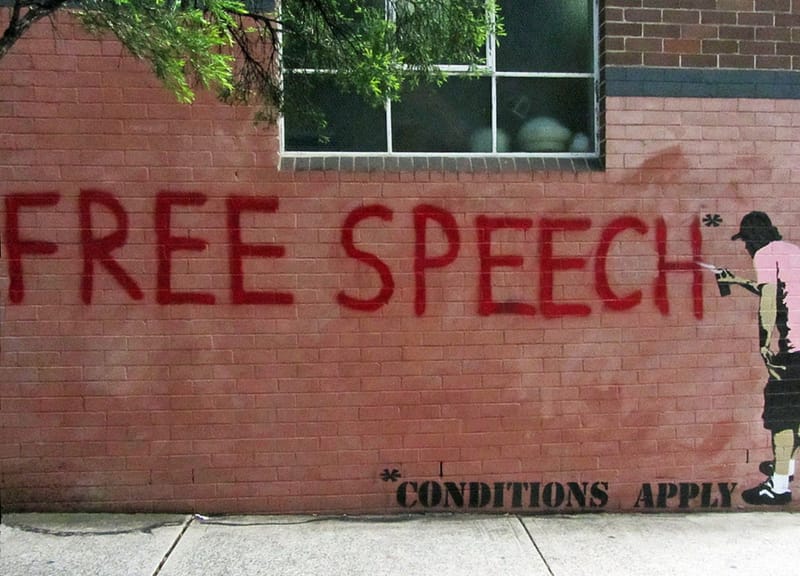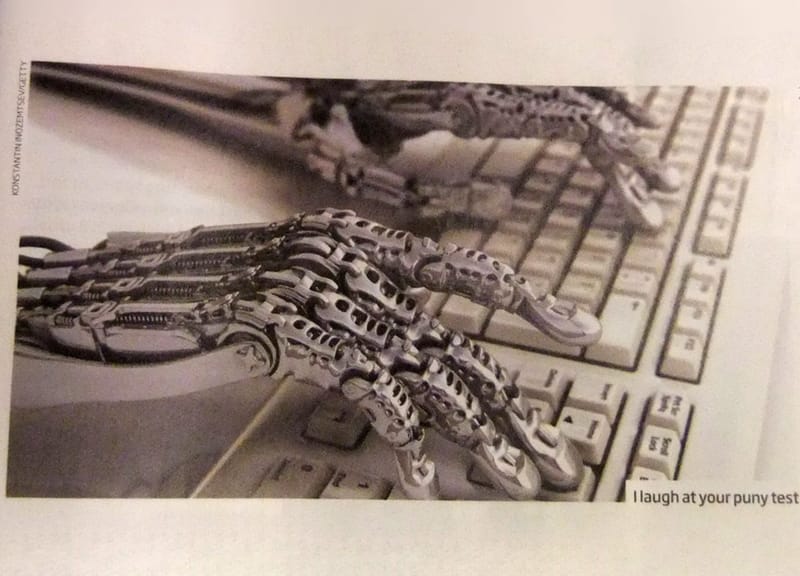You Don’t Have To Mourn Charlie Kirk
In its quest for empathy, the Left has lost its moral clarity

Our long history of human flourishing was predicated on our ability to check bad behaviour. In Luke Kemp’s Goliath’s Curse, he writes of the necessary counter-dominance strategies which evolved among hunter-gatherer societies to hamper the aims of malicious, domineering, or simply arrogant individuals. Our foremothers survived through their ability and willingness to cooperate and collaborate, but every once in a while, someone would grow into an adult who thought they should rule over their peers, and could do so through force. This violent individual had to be dealt with. Often, the strategies themselves were ruthless, including “teasing, gossiping, shaming, ridicule, and even expulsion from the group. The most severe cases could result in death.”1
Kemp tells the story of the Ju/’hoansi bushmen who struggled to contain the impulsive and brutal hunter, /Twa. After /Twa killed three other members of the tribe, the community decided to protect themselves. Every single man fired a poisoned arrow at /Twa and, after he fell to the ground, all the men and women stabbed him with spears, symbolically taking collective responsibility for his death: “/Twa’s attempt to dominate others cost him his life.”2
Cultures which enjoy harmony do so because they are willing to serve consequences to those who disturb the peace. In as recently as the 1980s, the populous indigenous society of West Sumatra was one of few around the world where women lived free of the threat of sexual violence. Any man who did transgress this strict rule faced severe repercussions, including physical assault, expulsion or death.
Some indigenous cultures find uses for these dangerous folk. In some tribal cultures in Papua New Guinea, men displaying psychopathic traits are forced to live apart from the village, deeper in the forest. However, they are not excommunicated. In times of war, this man is brought out of the forest to lead the tribe in battle. Recognising his stomach for violence, the tribe appoints him as War Chief because they understand he will be capable of leading them to victory no matter the cost. Once the war is over, he is sent back to the forest, and the peace-time Chief becomes the leader once more.
No matter the strategy for dealing with dangerous people, what all these cultures share is a willingness to confront the truth. These cultures recognise that those with a taste for violence and desire for dominance are different to the majority, and that these people therefore pose a threat to a societal structure which depends on egalitarian cooperation. The lessons of the stories above show that the many are responsible for the actions of the one, and that harmony is not a happy accident but a consequential effort. These cultures do not pray for peace, they wrench it from the maw of chaos.
As Iain McGilchrist said on last week’s episode, the universe exists as a tension of opposites: chaos/order, death/life, dark/light, winter/spring, wet/dry. The same goes for our social structures: Obscene wealth is built on the backs of the poor; high walls provide security for those who generate insecurity; equality comes at the expense of individual power. Some of our ancestors managed these tensions by cycling through different social organisations at different parts of the year, often forming hierarchical and authoritarian communities when stocking up on resources for winter, and disbanding into democratic, egalitarian groups for the rest of the year. These changes served purposes that were always geared towards the group’s survival. Our ancestors had to be realistic to survive. They knew that, sometimes, keeping the peace demanded conflict. Sometimes it even necessitated disorder, like sticking a poisoned arrow into someone’s flesh and hurrying its entropic decay.
The unrealistic expectations of our modern society, including that bad people won’t do bad things, are thanks to technological advancements which allow us to live utterly disconnected from any sense of reality. Access to enormous amounts of energy to transform the material world around us has, of course, transformed us. Gone are the seasonal cycles which we had to navigate to survive, and gone are the rituals of justice which depended on our collective responsibility. We mostly do what we want when we want, no matter the environment. This has created a culture which is more wedded to its ideologies than reality. Thanks to our technological ability to transform the conditions of our lives, creating steady states of temperature, comfort and access, we have lost sight of the opposites which govern our existence.
I often write about how these ideologies are driving our eco-crisis, pointing to the unrealistic demands of economic and political policy on the Earth. But this energy-blindness, as Nate Hagens calls it, does not merely muddy the waters in the halls of power. The Left is just as victim to its own privilege, its own adherence to ease as the Right. Over the last few days, I have witnessed Leftist rhetoric surrounding the murder of American right-wing extremist, Charlie Kirk, with fascination. While mainstream political pundits and hard right-wingers default to the passive “praying for peace” bullshit, the atheist Left has done much the same through its collective demand for empathy.
Their argument is that murder is always wrong because the loss of human life is inherently bad. We can infer this means that human lives are inherently valuable, and that there is something innately good about homo sapiens, a goodness that must transcend other species given every single one of these Leftists enjoys the privilege of existing in a world built with the body of Earth and our kinfolk: timber, metal, stone, water; deforestation, pollution, habitat loss, acidifying oceans. The phones they sit atop piles of books to record themselves pleading for empathy costs Earthly lives.
There is an inherent anthropocentrism in most Leftist thinking, from Marx through to Green New Deal architects. I think it is mostly founded in ignorance rather than malice, and there is little such people can do about the superstructures they live in, just like I am forced to use a device whose production will have generated over 100kg in waste just to write this all to you. Unlike my fellow Lefties, however, I do not believe in the inherent value of single lives, but rather value the web of relationships which keeps us all alive. Yet, while I do not believe those I love are inherently more valuable than those I do not, they are more valuable to me than a whole world without them. This is the tension which creates the canvas for the big picture to be painted upon.
The Left fails to hold this tension. Its morality collapses in on itself, demanding the values with which we see the collective be attributed to a single human life. It demands a form of empathy which erases reality and refuses to confront the actions and speech of that human being, conveniently championing the fact of their humanness over evidence of their lack of humanity. The Left does this because it is frightened of losing its own humanity, and the moral superiority it affords. Such morality is merely a self-soothing device for those who are afraid to confront the truth that none of us, alone, are special.
One would think it obvious that there is nothing inherently special about human beings by virtue of the fact we do not feel compelled to attend the funerals of passing strangers. There is, however, something inherently special about what we create together: languages, customs, rituals, myths, dance, music, art. These are the practices through which our humanity exercises itself. The violence of our world is wrought by individuals who believe they possess a singular value more precious than our collective humanity. The empathy we afford them should be an honest appraisal of the forces that acted upon them to make them who they are, not a glib assertion of our hallowed universality.
I have empathy for Charlie Kirk. He grew up in a misogynistic, racist, individualistic, capitalist, domineering and collapsing culture. He was born to Republican parents and force-fed the Bible. He behaved badly, from a moral perspective, and was rewarded for it. At no point were his actions de-incentivised by his community. He was paid top dollar to spread hatred, sow disinformation, and undermine civil rights. He repeatedly insisted that the price of freedom was to be paid in human lives. Specifically, Kirk said: “It’s worth it to have a cost of, unfortunately, some gun deaths every single year so that we can have the Second Amendment.”
By his own beliefs, Charlie Kirk was not a victim of political violence—his death was a consequence of “freedom”. This was the same logic that saw him unashamedly champion murdering thousands of Palestinians to achieve Israel’s “freedom”. Charlie Kirk claimed that freedom came at a price as long as it cost him nothing.
Charlie Kirk was racist, misogynistic, exploitative and opportunistic. He said that black women had small brains, that women should “submit to their husbands”, and that child victims of rape should not be allowed abortions. Yet, I am sure his children and wife considered him a good man, which is why they will mourn him, and should have every right to mourn him. But if the Left cannot find a single discernible quality for someone beyond their homo sapiens DNA, then what exactly are they mourning when that life passes? Humanity itself? Does that mean they believe our ancestors were less human than us for doling out severe punishment to the hateful, the arrogant, the domineering? If so, the Left buys into the belief that the growth of technological civilisation is the root of human progress and the genesis of civility. By that logic, they should advocate for colonisation.
There is a stark difference between welcoming the death of a collective because of their identity and welcoming the death of an individual because of their actions. One is grounded in ideological hate, the other in reality. And reality dictates that death comes to us all, and life dictates that we accept this. The tree I fell to feed my stove is a welcome death, for which I am grateful. The deer I shoot to feed my family is a welcome death, for which I am grateful. The elder who suffers old age eventually passes into peace; hers is a welcome death, for which I am grateful. The man who murders three of our kin in the pursuit of power is a death I welcome with a dagger in hand. Every single Leftist who uploaded a video from the wealthiest nations in the world claiming humanity is defined by a refusal to kill only proved they are ungrateful for the deaths which allow them to live.
Our ancestors bore responsibility for the world with kindness and with blood-stained fingers. They could afford themselves nothing less than moral clarity; nothing less than reality.
Planet: Critical investigates why the world is in crisis. Join subscribers from 186 countries to support the project today.
Kemp, Luke. Goliath’s Curse: The History and Future of Societal Collapse (p. 38). (Function). Kindle Edition. ↩
Kemp, Luke. Goliath’s Curse: The History and Future of Societal Collapse (p. 38). (Function). Kindle Edition.
Update: The headline of this article was updated on September 18th to better reflect the subject and argument of the piece. ↩



